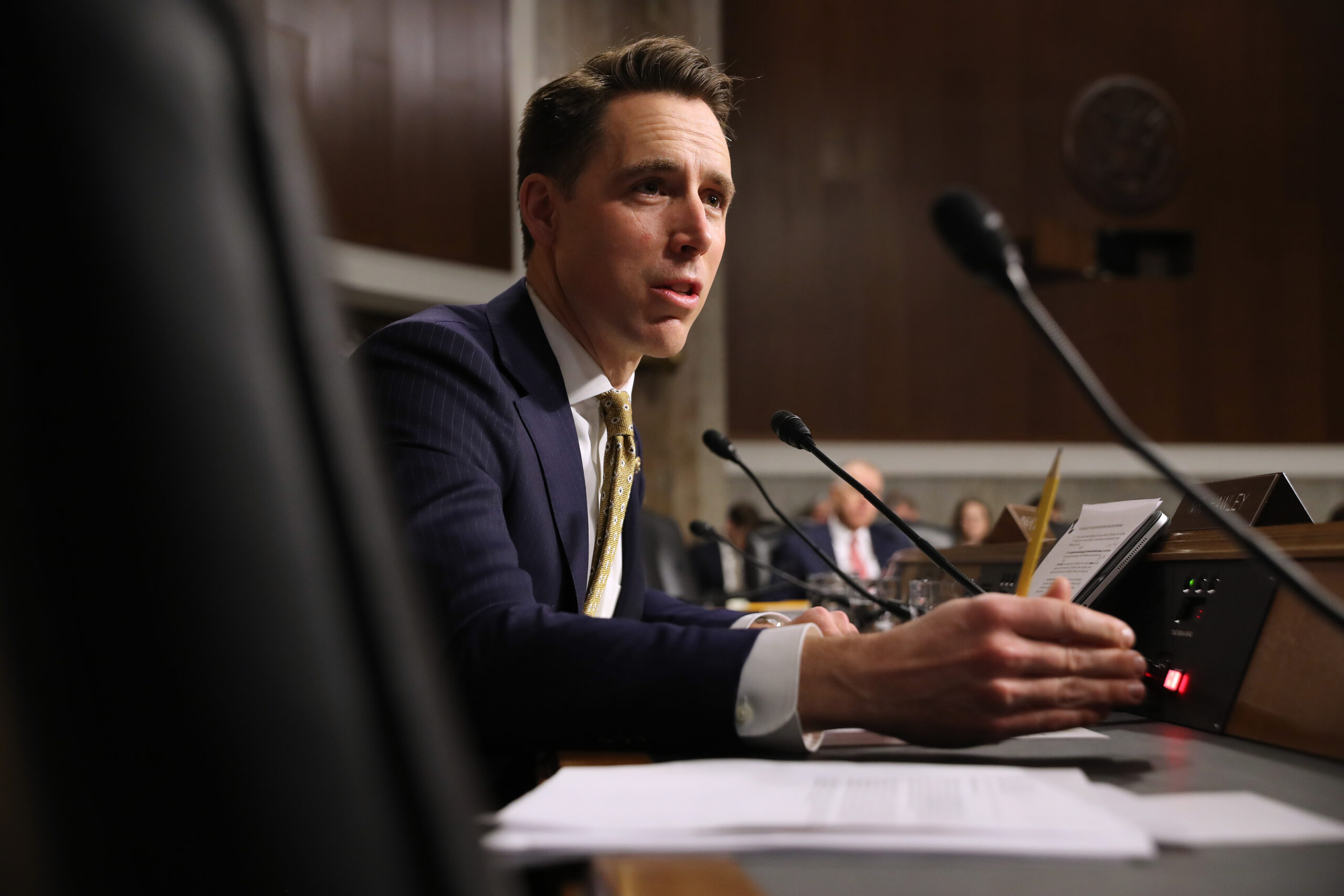Josh Hawley Introduces Anti-Big Tech Legislation After Google Targets the Federalist

Chip Somodevilla/Getty Images
Sen. Josh Hawley (R-MO) introduced new legislation targeting Big Tech on Wednesday, just one day after he called out Google for issuing a warning to conservative opinion website The Federalist.
According to an exclusive report from Axios, “The Limiting Section 230 Immunity to Good Samaritans Act would prevent major online companies from receiving the protections of Section 230 of the Communications Decency Act unless they revise their terms of service to include pledges to operate in good faith and details of their content moderation policies.”
“Under Hawley’s bill, users who believe the provider is not ‘operating in good faith’ by consistently and fairly applying its content rules could sue for $5,000 and attorneys’ fees,” Axios reported, adding that the bill is co-sponsored by Sen. Marco Rubio (R-FL), Sen. Tom Cotton (R-AR), and Sen. Mike Braun (R-IN).
Section 230 of the 1996 Communications Decency Act provides legal immunity to websites with third party content which are not considered publishers.
It reads, “No provider or user of an interactive computer service shall be treated as the publisher or speaker of any information provided by another information content provider.”
In other words, as Mediaite explained last month, it protects these sites from “legal responsibility of what its users post. So, if someone on Instagram were to post something that defames another person or business, the poster can get sued, but Section 230 would protect the platform.”
This bill would prevent companies from receiving those protections if they failed to meet the requirements of Hawley’s legislation.
The announcement of Hawley’s bill on Wednesday came just one day after the senator called out Google for threatening to demonetize the ad revenue of The Federalist over its comment section.
After NBC News reported that the Federalist and ZeroHedge “will no longer be able to generate revenue from any advertisements served by Google Ads,” Hawley responded, “Translation: @NBCNews goes to a monopolist to ask for action against two competitor outlets and the monopolist agrees to ban them. This is the free market?”
Translation: @NBCNews goes to a monopolist to ask for action against two competitor outlets and the monopolist agrees to ban them. This is the free market? https://t.co/5YEW3ton9x
— Josh Hawley (@HawleyMO) June 16, 2020
So @NBCNews was lying about this or was misinformed about the deal you had with them … or what? https://t.co/6EpGq90JcG
— Josh Hawley (@HawleyMO) June 16, 2020
Google soon backtracked on its statement that it demonetized the website, claiming that it had been working with The Federalist “to address issues on their site related to the comments section,” because the company’s “policies do not allow ads to run against dangerous or derogatory content, which includes comments on sites.”
That prompted Hawley to bring up Section 230.
“Wait, wait – you want to treat the @FDRLST comment section, which they don’t curate, as THEIR speech but simultaneously say the content you directly host and modify IS NOT your speech under Section 230? Wow, this is getting really interesting,” Hawley declared.
Wait, wait – you want to treat the @FDRLST comment section, which they don’t curate, as THEIR speech but simultaneously say the content you directly host and modify IS NOT your speech under Section 230? Wow, this is getting really interesting https://t.co/QEtpCtssco
— Josh Hawley (@HawleyMO) June 16, 2020
Section 230 has faced heavy scrutiny over the past few years from commentators and politicians who argue major tech companies and social networks have transformed into publishers which selectively edit and curate content.
In May, President Donald Trump expressed support for the removal of Section 230 protections, tweeting, “REVOKE 230!”
REVOKE 230!
— Donald J. Trump (@realDonaldTrump) May 29, 2020
The View co-host Meghan McCain — whose husband Ben Domenech co-founded and publishes the Federalist — thanked Hawley for the legislation on Wednesday.
“Really grateful to you Senator and (@SenTomCotton @marcorubio) for introducing legislation to stop Silicon Valley censorship,” she wrote. “The fact @Google thinks they can deplatform publications because they don’t agree with their politics is petrifying & dangerous to all Americans.”
Really grateful to you Senator and (@SenTomCotton @marcorubio) for introducing legislation to stop Silicon Valley censorship. The fact @Google thinks they can deplatform publications because they don’t agree with their politics is petrifying & dangerous to all Americans. https://t.co/NEOC0z9nCu
— Meghan McCain (@MeghanMcCain) June 17, 2020
Have a tip we should know? tips@mediaite.com




